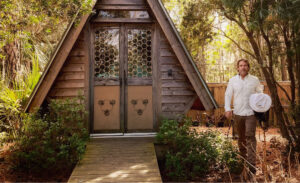
Latitude Craft Chocolate – A Vertically Integrated Social Enterprise
Latitude Craft Chocolate is a sustainable and transparent bean-to-bar chocolate company made at its origin in Uganda.
Afghanistan
Mood of Living December 19, 2015
In 2014, Kimberly Jung, an American veteran, brought together a cadre of her fellow veterans to launch something completely new: a socially-minded enterprise connecting Afghan farmers to global markets and American consumers to ethically sourced spices. Saffron – a sought-after spice – brings any number of sensory images to mind, from a splay of delicate red branches to an indulgently flavored paella. Rumi Spice CEO, co-founder, and former U.S. Army Engineer Officer Kimberly Jung saw even more in saffron: the potential for change.
Although Rumi Spice is a for-profit company, any conversation with Jung instantly dispels any delusions that the heart of her company is anything but its people. 2016 has already seen Rumi Spice honored with the Specialty Food Association’s prestigious Leadership Award. Jung and Rumi Spice’s farmers are well on their way to carving out a space for Afghanistan and Afghanis in the global market.
Mood of Living: Why saffron, of all of Afghanistan’s products?
Kimberly Jung: Afghanistan’s hot, dry winds and arid climate make it the perfect atmosphere to grow saffron. It is a spice that is used internationally, in a variety of cultural dishes, making it easier to immerse our product in the international market and, thus, to help out the Afghan people.
Additionally, saffron can give farmers up to 6 times more income than growing poppy for opium. More importantly, it does not interfere with the crop cycles for wheat and barley, which are essential for food consumption. Lastly, on a business level, saffron boasts a high value to low weight ratio, making it ideal for starting an import-export business.
MoL: How does your position as an import-export business reflect your mission?
K.J: By connecting one of Afghanistan’s best resources, its people, to international markets, Rumi Spice aspires to catalyze economic development in the region through a market-driven approach.
MoL: What role do Afghan producers play in your leadership structure?
K.J: Our Afghan farmers are our partners. In Afghanistan, Rumi Spice operations are an Afghan-led effort. We wouldn’t be able to have this company without their amazing saffron, and they wouldn’t have access to the international market without Rumi Spice. It truly is a mutually beneficial relationship that we both respect and honor. That’s the beauty of a social enterprise – success and social benefit go hand in hand!
MoL: What does the name “Rumi Spice” mean, in general and to you?
K.J: “Where there is ruin, there is hope for treasure” is a famous quote by the Persian poet Rumi. It totally pertains to what we are trying to do at Rumi Spice – using the treasures of saffron and the incredible talents of the Afghan people to cultivate peace and prosperity in a country devastated by war.
The poet, Rumi, represents bringing together people a long distance away from each other through love and respect. This touches at the very core of our mission at Rumi Spice as we attempt to tie together American and Afghan cultures.
MoL: What aspect of Rumi Spice do you personally identify with the most strongly?
K.J: Rumi Spice is a truly special organization because the social impact is intertwined closely with the business. Social and financial returns are not mutually exclusive. As Rumi Spice grows, the farmers in Afghanistan prosper, the saffron industry grows, and a foundation is laid for peace and economic prosperity.
MoL: What were some of the challenges Rumi Spice encountered in the beginning?
K.J: A lot of people didn’t think it was possible – even my fellow veterans who spent a great deal of time in Afghanistan. Believing in my idea enough to keep going through with it was tough, but I’m glad we did it!
Starting a food business is tough because it’s all about knowing people, and I’d never worked in the food industry before. Additionally, the supply chain in Afghanistan can be complicated to navigate. But I think that, with time, we’ve gotten better with that part of it.
MoL: Describe a high point in Rumi Spice’s work or development. Why this moment?
K.J: I think the Fancy Food Show in New York City was a fantastic opportunity for us a growing company. Not only were we able to meet a lot of wonderful people who can help us in a variety of ways, but we also were able to understand the areas in which we can improve in moving forward! We aspire to build the Afghan brand so it becomes recognized again as a breadbasket.
MoL: What is the future vision for Rumi Spice?
K.J: We hope to work with as many Afghan farmers as we can and to become the catalyst for economic development in the region. Someday, we might consider working with other Afghan products like pistachios to further increase the number of Afghans that we can help!
MoL: What about yourself? Where do you see yourself in 10 years?
K.J: Hopefully still working hard on Rumi Spice. I want to see the company become an ambassador for goodwill that represents the Afghan global brand positively.
Personally, I will always be fighting for a cause, one way or another, because I believe in living life absolutely to the fullest. For me, that means pursuing goals worth fighting for despite adversity, unpopularity, and personal comfort.
MoL: What is your personal inspiration?
K.J: From Harvard Business School: “What would you do with your one wild and precious life?” Having spent two years with some of the brightest minds in the world, I discovered that you have the ability to accomplish everything you want if you are willing to take a chance and go after it.
MoL: What advice can you give anyone looking for some way to make a difference or feeling disconnected from change?
K.J: Go out there and start talking to people and meeting people in your community – that’s the best way to find your inspiration! Bounce ideas off of other people and work with others.
MoL: How can readers become involved with Rumi Spice?
K.J: For starters, check out our website for creative recipes that incorporate saffron in your daily cooking, and indulge in the excellence that is Afghanistan saffron. And feel free to follow us on social media!
Photography courtesy of Rumi Spice

Latitude Craft Chocolate is a sustainable and transparent bean-to-bar chocolate company made at its origin in Uganda.

Creating an equitable spice trade by disrupting an outdated trade system and putting money and power into the hands of Indian farmers.

Helping to save the bees by building hives, pollinating flowers, powering food supply, and spreading beauty.